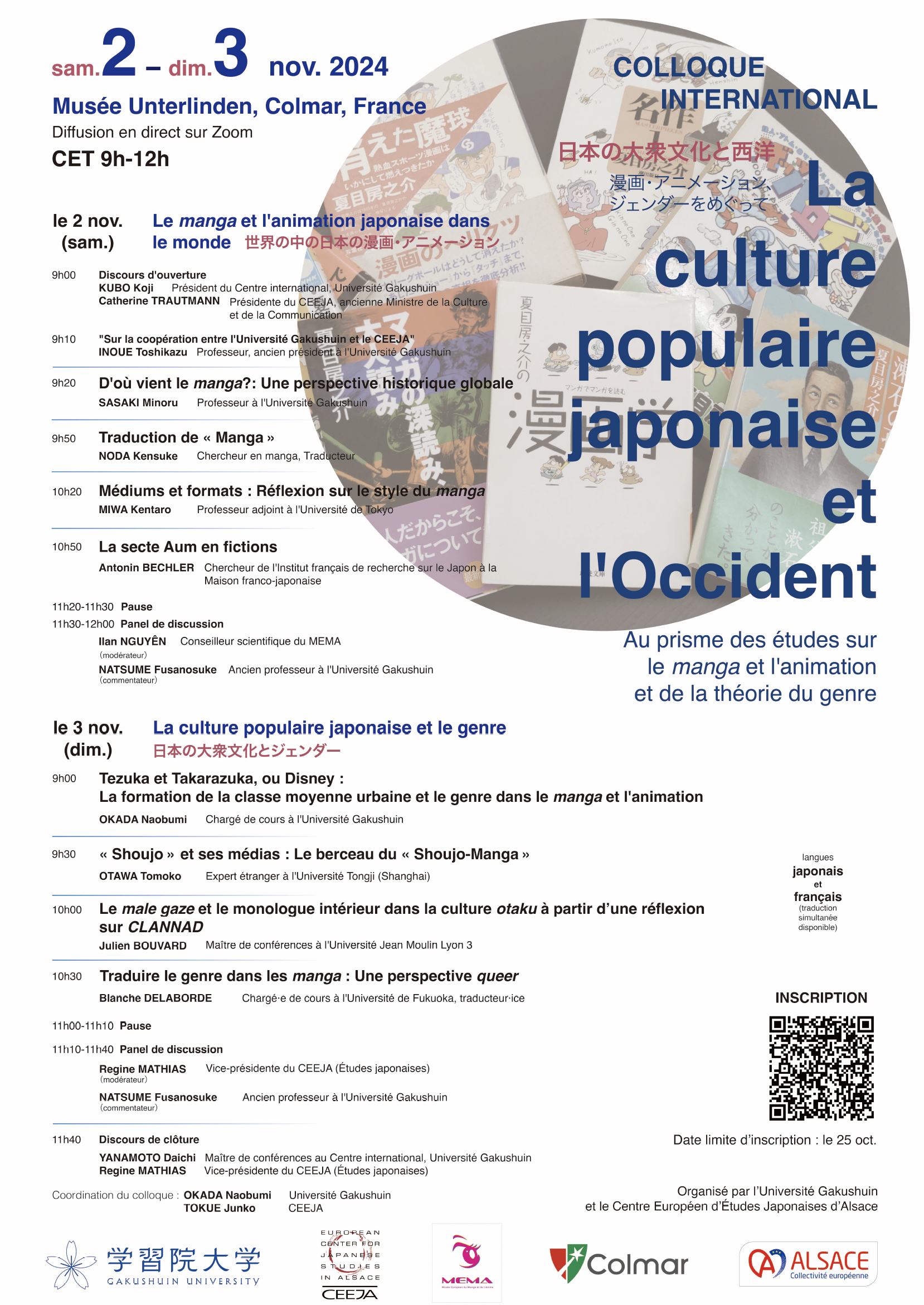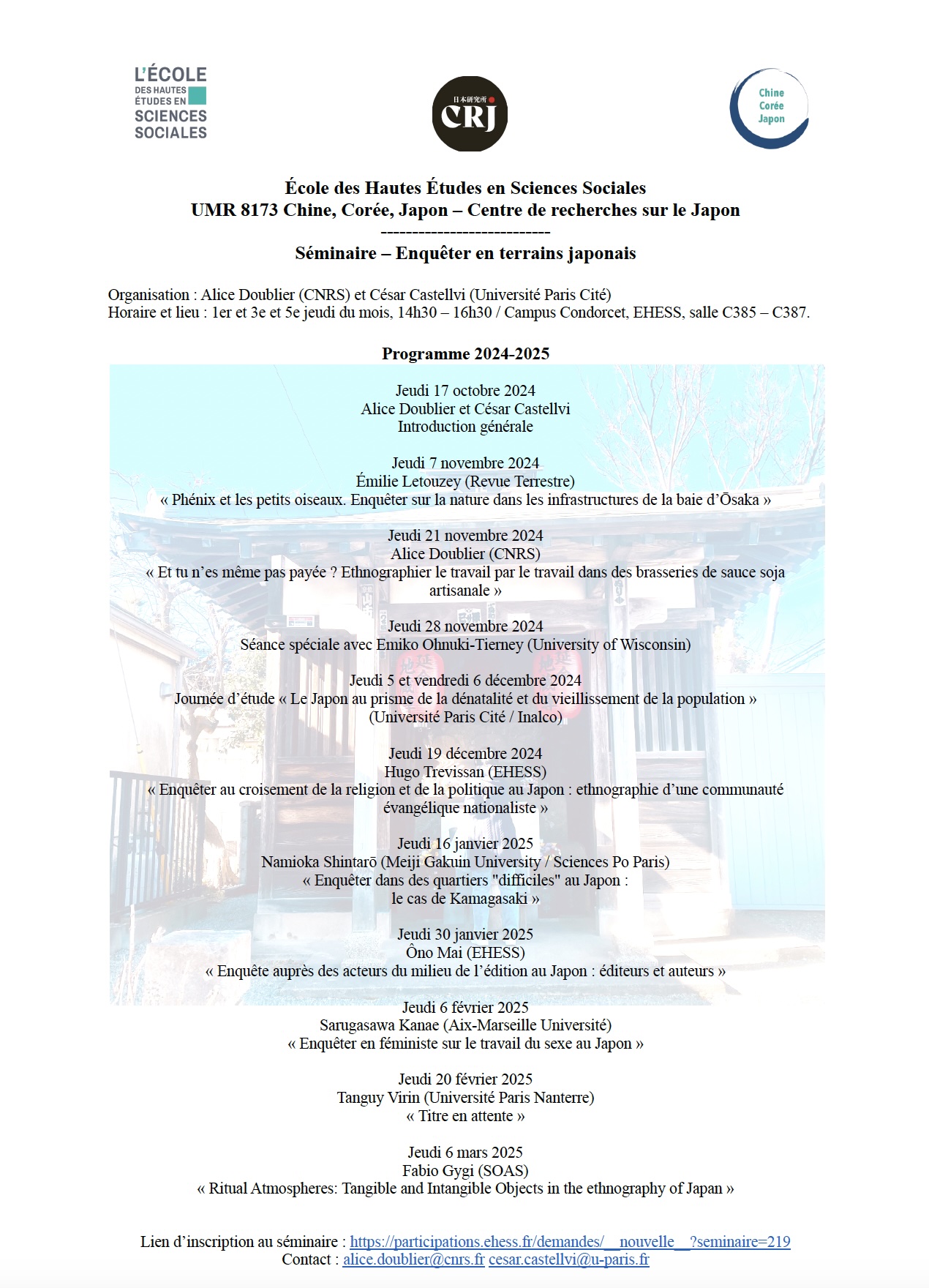L’année 1995 est souvent traitée comme un tournant dans l’histoire du Japon contemporain. L’archipel, en crise depuis l’éclatement de la bulle économique, est en pleine remise en cause de son système social et économique. Dans ce contexte de tension, le pays est particulièrement secoué par le grand séisme de Kōbe. Le plus frappant événement de cette année reste néanmoins l’attentat au gaz sarin perpétré par la secte Aum shinrikyō dans le métro de Tokyo, qui représente le point d’orgue de l’ « affaire Aum ». Quel héritage laisse à la société japonaise cette « affaire Aum », comment s’inscrit-elle plus largement dans l’année 1995 et comment appréhender ces objets depuis la diversité des disciplines académiques constituant les études japonaises ? Un triple questionnement que se proposent de traiter deux journées complémentaires centrées respectivement sur l’affaire Aum en particulier (Inalco/IFRAE, UPC/CRCAO, MFJ ; Paris, 20 mars 2025) et sur une mise en perspective historique et culturelle plus générale de l’année 1995 (U. Jean Moulin Lyon 3/IETT, MFJ ; Lyon, date à venir) à l’occasion de son trentenaire.
Journée 1 (Inalco/IFRAE, UPC/CRCAO) : « L’héritage de l’affaire Aum à la société japonaise : 30 ans après les attentats au gaz sarin du métro de Tokyo »
Argumentaire
L’« affaire Aum » (オウム事件) constitue un des événements majeurs qui frappent la société japonaise des années 1990. Son retentissement est perceptible dans de nombreux domaines : le religieux bien sûr, mais aussi le droit, la culture, les médias, la littérature, la politique ou encore les questions de sécurité.
Trente ans après les attentats au gaz sarin du 20 mars 1995, point culminant de la « décennie Aum », que reste-t-il de l’héritage que le nouveau mouvement religieux laisse au Japon ? C’est à ce thème volontairement général que nous souhaitons consacrer une journée d’étude dont l’objectif sera de réfléchir à la façon dont les différents épisodes qui ont marqué les années Aum continuent d’influencer divers aspects de la société.
Cette journée d’étude se veut transdisciplinaire, les communications attendues pourront de fait s’inscrire dans des domaines variés (littérature, droit, anthropologie, études cinématographiques, sociologie, sciences religieuses). Chaque communication, d’une durée de 20 minutes, sera suivie d’un temps de discussion. Elle s’inscrit dans le cadre d’un double événement en partenariat avec
Calendrier prévisionnel
- 30 octobre 2024 : envoi des propositions de communication (aux adresses mail des organisateurs); proposition de titre / nom et affiliation de l’auteur / résumé (en français, anglais ou japonais) d’une dizaine de lignes
- 15 novembre 2024 : réponse du comité d’organisation (le comité pourra vous proposer de présenter votre communication lors de la journée 1 ou de la journée 2 en fonction de son adéquation avec leur thématique respective)
- 20 mars 2024 : journée d’étude 1 (Paris)
Organisation
- Antonin Bechler (Université de Strasbourg/GEO)
- Julien Bouvard (Université Jean Moulin Lyon 3/IETT)
- César Castellvi (Université Paris Cité – CRCAO)
- Édouard L’Hérisson (Inalco – IFRAE)
- Chūjō Chiharu (Université Jean Moulin Lyon 3/IETT)
- Muramatsu Kenjirō (Université Jean Moulin Lyon 3/IETT)
Les propositions concernant l’événement « L’héritage de l’affaire Aum » sont à envoyer à César Castellvi (cesar.castellvi@u-paris.fr) et Edouard L’Hérisson (edouard.lherisson@inalco.fr).


